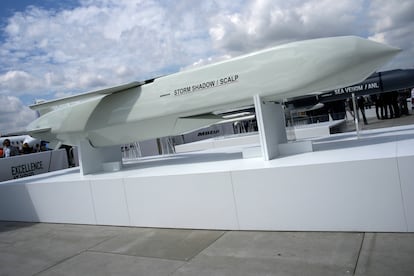The Taurus, the German weapon that Ukraine wants to use to strike Russian targets away from the front lines
The shortage of air-to-surface cruise missiles in Ukrainian and European arsenals means that Germany is the only ally that can meet Kyiv’s demand in the short term

Taurus missiles have become one of Ukraine’s most coveted weapons in the war unleashed by Russia’s invasion. These weapons have also become a headache for Germany. German Chancellor Olaf Scholz continues to refuse to supply Ukraine with these air-to-surface cruise missiles, which are similar to the ones sent by the United Kingdom and France, which have allowed Kyiv to strike Russian targets far away from the front lines. Pressure on Berlin is growing in parallel to the Ukrainian army’s need to replenish this type of weaponry, which is in alarmingly short supply throughout Europe. “In the short term, Germany is the only country that can deliver a considerable number of missile systems like these, which are absolutely essential for the Ukrainian army,” says Fabian Hoffmann, a researcher at the University of Oslo.
The Taurus missile is one of the most advanced weapons available to the Bundeswehr (the German army). Roughly speaking, it is very similar to British Storm Shadows and SCALP missiles, the French version. They are all long-range cruise missiles that are launched from fighter aircraft, similar in size and mass, and reach close to the speed of sound. Even so, the Taurus missile is more modern than the Storm Shadow/SCALP missiles and more effective against targets with reinforced security, such as bunkers and bridges.
Hoffmann estimates that Ukraine has received between 400 and 600 Storm Shadow and SCALP missiles from France and the United Kingdom since the war began. According to his calculations, by the end of this year, or early next year at the latest, Kyiv will have used all of the air-to-surface cruise missiles that its allies have provided. Like other European analysts, the Norwegian expert believes that it is likely that Italy also sent some of the 200 SCALP missiles it acquired in 1999, although it did not announce doing so. In the short term, the possibility of London and Paris delivering more of these types of missiles seems to have been ruled out; Hoffmann estimates that the two countries have donated between 25% and 45% of the weapons in their arsenals over the last two years.
Last May, Kyiv formally asked Berlin to deliver some of its Taurus missiles, which cost between €1.1 million and €1.5 million ($1,198,450 to $1,634,250) per unit. A few days ago, the German government rejected London’s proposal offering to send more Storm Shadows to Ukraine in exchange for Germany handing over some of its Taurus missiles; Berlin has experienced some friction over the issue. In recent weeks, Scholz has reiterated that he is not considering the possibility of supplying cruise missiles to Ukraine, claiming that it could imply a direct confrontation with Russia and that it would be necessary to deploy German troops on Ukrainian territory for the allied army to be able to use this weapon.
“The only reason why German soldiers would be needed on the ground to operate the Taurus is that the chancellor does not trust what Ukraine can do with them,” says Hoffmann. He adds that the Ukrainian army could be independently instructed to operate them within three to four months. Lidia Gibadlo, a researcher at the Center for Eastern Studies (OSW) in Warsaw, emphasizes that “Scholz will probably rely on his party’s support, as well as on the popular rejection of sending the Taurus missiles reflected in the polls, to remain firm in his position.”
Jacek Tarocinski, Gibadlo’s colleague at OSW, points out that the only solution to Ukraine’s current shortage of cruise missiles is for “Germany to send some of its own and to produce and acquire more as soon as possible.” The expert notes the short supply of this type of weapon throughout Europe and adds that, last Tuesday, the U.S. State Department approved the sale of 821 Jassm missiles—the missile most like the Taurus produced on the other side of the Atlantic—to the Polish Air Force, a greater quantity than the 600 that the German Armed Forces have.
U.S. missiles ruled out
Delivering Taurus missiles to Kyiv would not just alleviate the shortage of air-to-surface cruise missiles, which have been employed efficiently to reach command posts and ammunition and gasoline depots, disrupt and alter routes essential to Russian logistics and eliminate high-ranking members of the enemy army. Such missiles have also destroyed several ships in the ports of Sevastopol and Feodosia, in the Ukrainian peninsula of Crimea, which Moscow illegally annexed in 2014. German missiles would also be more effective than French and British ones against targets such as bridges, as the Mephisto warhead is equipped with a smart fuse that allows for detonation to be delayed until it has penetrated the targeted structure.

The analysts who spoke to EL PAÍS agree that Taurus missiles are the ideal weapon for attacking the bridge over the Kerch Strait, which connects Crimea to Russia and which Kyiv has considered a priority target since the war began. Last week, Moscow leaked German military talks speculating that Kyiv would use the Taurus missile to attack this infrastructure, which is critical for Russian logistics. In the leaked conversation, German military personnel stressed that, unlike the Storm Shadow and Scalp, the Taurus “could penetrate the structure.” Moreover, the German missiles would be even more difficult for Russian anti-aircraft defenses to intercept than the French and British ones.
Taurus and Storm Shadow missiles have been out of production for years. France is producing between 50 and a 100 SCALP missiles that Greece ordered. Hoffman argues that Paris should deliver them to Kyiv instead and compensate Athens in some way. The Norwegian researcher emphasizes that a delivery of some German Taurus missiles, or the SCALP missiles requested by Greece, would not solve the issue in the long run. “The only way to definitively address this problem would be to make it easier for the Ukrainian arms industry to manufacture such missiles, while [also] restarting production in Europe to be able to keep supplying them on a continuous basis,” Hoffmann notes.
While Ukraine is desperately seeking an ally to deliver long-range cruise missiles, Russia continues to use this type of weaponry to strike energy infrastructure and cities far from the front lines. A recent report by the British think tank Royal United Services Institute (RUSI) puts the monthly production of air-to-surface missiles in the Eurasian giant at around a 100. Tarocinski highlights the fact that the Russian army has launched over 500 of them in a month, more than the Ukrainians have done in the entire two years of war.
Sign up for our weekly newsletter to get more English-language news coverage from EL PAÍS USA Edition
Tu suscripción se está usando en otro dispositivo
¿Quieres añadir otro usuario a tu suscripción?
Si continúas leyendo en este dispositivo, no se podrá leer en el otro.
FlechaTu suscripción se está usando en otro dispositivo y solo puedes acceder a EL PAÍS desde un dispositivo a la vez.
Si quieres compartir tu cuenta, cambia tu suscripción a la modalidad Premium, así podrás añadir otro usuario. Cada uno accederá con su propia cuenta de email, lo que os permitirá personalizar vuestra experiencia en EL PAÍS.
¿Tienes una suscripción de empresa? Accede aquí para contratar más cuentas.
En el caso de no saber quién está usando tu cuenta, te recomendamos cambiar tu contraseña aquí.
Si decides continuar compartiendo tu cuenta, este mensaje se mostrará en tu dispositivo y en el de la otra persona que está usando tu cuenta de forma indefinida, afectando a tu experiencia de lectura. Puedes consultar aquí los términos y condiciones de la suscripción digital.









































